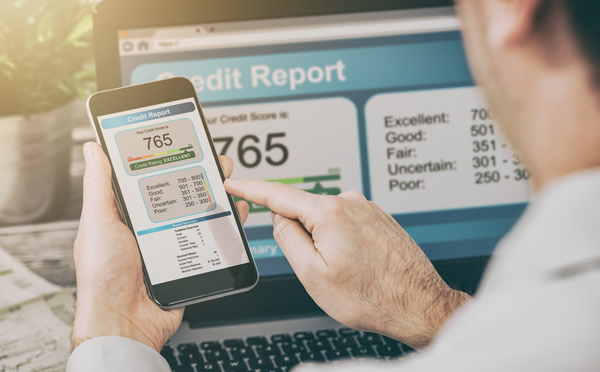While lenders use many factors to determine loan eligibility, your credit score remains one of the most significant factors in the determination process. Whether you’re interested in a personal loan for debt consolidation, a loan to pay off debt, or a personal loan for credit card debt, the place to begin the process is by checking your credit score and looking for opportunities to improve it before applying for additional loans.
How to Get a Free Copy of Your Credit Score
You are entitled to one free copy of your credit score by each of the big three reporting agencies every 12 months. Who are the big three?
- Experian
- Transunion
- Equifax
If you’re interested in keeping up with your credit score over time, consider rotating requests between the three, so that you request one credit score every four months. Doing this allows you to see signs of trouble quickly, allowing you to act appropriately to address these issues and improve your score.
Why is it important to check your credit score often? Honestly, it’s the first line of defense for your good credit because it helps you do the following:
- Identify forgotten or overlooked credit accounts, so you can address them.
- Recognize early signs of identity theft.
- Correct errors, outdated information, and incorrect data on your credit report.
- Keep your credit score where it should be based on your actual credit history.
Before applying for any type of loan, it’s a good idea to begin working on your credit six months to one year ahead of time to make sure you have the right score to secure credit approval, lower interest rates, and better repayment terms in general from lenders.
How do you order your credit scores online?
- Obtain a free copy of your credit report and FICO® score by visiting their website.
- Visit the Transunion website for a free copy of your annual credit report.
- Get a free copy of your Equifax credit report by visiting their website.
Changing Behavior to Improve Your Credit Score
If your credit score isn’t quite where you’d like it to be, there are things you can do that will improve your credit score over time. Even small changes in the right direction are good for you and your overall credit availability. However, these changes do not work overnight. In fact, they can take months before they deliver a notable difference in your credit score. Start small, though, by making these changes.
- Lower your credit utilization score. Credit utilization is the amount of credit you’ve used compared to what is available to you. For instance, if the total limit of all your credit cards is $5,000 and you have $2,500 in outstanding credit card debt, your credit utilization is 50 percent. Lenders like this number to be below 30 percent. Pay down your credit card debt to improve this score quickly.
- Pay your bills on time. A history of late payments is a red flag for lenders. You can clear that up by making future payments on time, but it will take time to reflect well in your credit score.
- Keep a reasonable debt-to-income ratio. This is another number lenders love to see below 30 percent. While it does not have as negative an impact as a high credit utilization score, it can make a difference in your approval odds, interest rates, and whether or not you need collateral for your loan.
Small moves like these can make a huge difference in your credit score over time as these are all factors that reflect in your credit score and affect the likelihood of loan approval.
All hope is not lost if your credit score is not as high as you’d like it to be when applying for loans. Debt consolidation loans for bad credit can be instrumental tools for helping you reduce your credit utilization score and improving your credit score by eliminating the debt of several outstanding credit cards. Another option is to consider debt relief loans for bad credit. We can help you decide which loan option is best for you and walk you through the application process. Contact us today to learn more.


